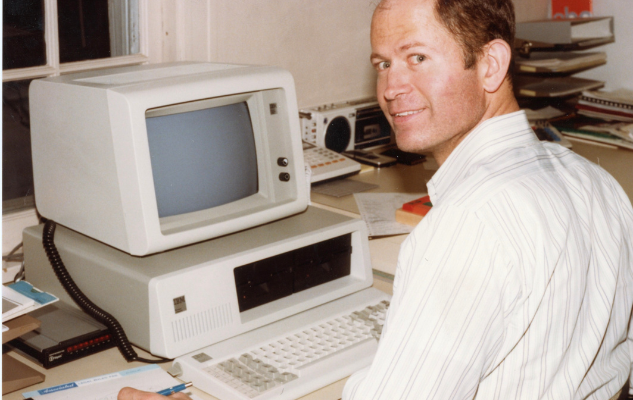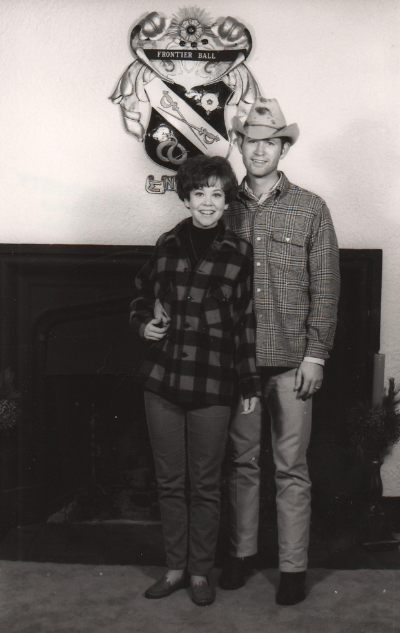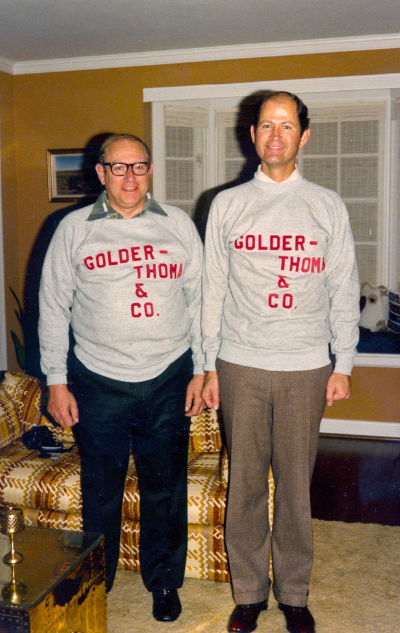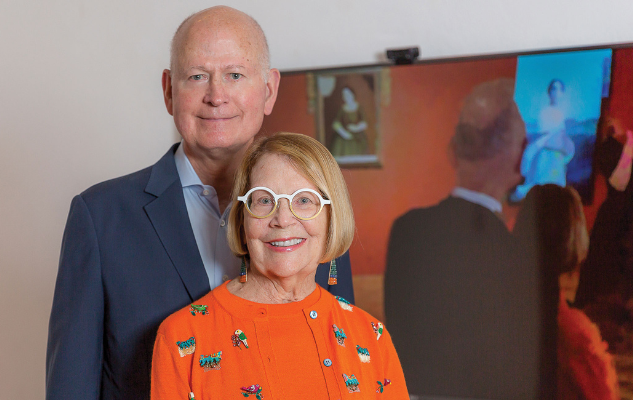Features
Carl Thoma (Oklahoma State) has led a life of servant leadership, instilled through lessons learned during his upbringing in rural Oklahoma and guided by the tenets of Sigma Nu. The Fraternity's core principles of Love, Honor, and Truth remain integral to Thoma’s life decades after joining the Sigma Nu brotherhood.
Thoma’s quiet demeanor belies the fact that he stands atop the titans in the private equity world, often included among the “founding fathers” of the industry. As founder and managing partner, Carl helped transform Thoma Bravo into one of the world's top five private equity firms over the last four decades. He is widely recognized as a pioneer of the buy-and-build strategy that is the foundation of Thoma Bravo's approach. Despite his expansive list of achievements and accolades, Thoma shuns the spotlight. With an understanding that success is rarely a solo sport, he believes in “steady perseverance and the willingness to let other people take the limelight and succeed.”
During Thoma’s induction into the Sigma Nu Hall of Fame in 2023, he said the guiding principles of his business are based upon the same attributes that form the core of the Fraternity, which he took to heart as a candidate of the Epsilon Epsilon Chapter at Oklahoma State in 1967. Further, he drew a connection between selecting the right mix of candidates for a chapter and employees for his firm, saying, “A successful business starts by getting the right people on the team.” He concluded, “I believe in creating and embedding our own culture into Thoma Bravo much like Sigma Nu does within our [brotherhood].” The culture cultivated by Carl emphasizes integrity across all aspects of the company. This high level of integrity is fostered through "trust, honor, and love," which are essential elements in all relationships.
In the private equity arena, Thoma has focused on convincing individuals, institutions, and endowments to invest their money. Commenting on his commitment to clients, he said, "Our company asks for investments for twelve years, with no say over how the investment is being managed, [we] invest it ethically, build up companies, and then return the profits back to our clients.” Reflecting on his time as a fraternity brother, he suggested, “This principle also comes back to Sigma Nu…Excelling with Honor.” The notion of “Excelling with Honor” encourages Sigma Nu brothers to strive for excellence and integrity while helping others along the way.
Thoma’s impact extends well beyond Wall Street and executive boardrooms. He and his wife, Marilynn, whom he met at Oklahoma State, are major benefactors of the arts and education. For decades, they have quietly and consistently supported projects that celebrate and promote the arts, provide college scholarships to deserving students, and help artistic and educational communities thrive.

Deep Roots, Resiliency, and Role Models
Thoma grew up in the panhandle of Oklahoma where ranching and farming are a way of life, and success is measured more by character than bank accounts. He believes his approach to life and business can be traced to his upbringing on the acres of Great Plains soil where generations of Thomas have worked the land. Speaking on his early lessons in resiliency, Thoma said, “When you grow up in a rural environment, from the very beginning, you become very self-motivating in getting things done.”
Life on a ranch was not easy. Thoma took a 25-mile bus trip each morning to school and returned home to a lengthy list of chores. He was in junior high before telephone lines reached their home and in college by the time his family owned a television. Thoma’s father passed away in the spring of his sophomore year. His worldview as an adolescent ended at the Oklahoma horizon; beyond that, the world lay uncharted.
Thoma’s focus on hard work and determination was instilled from an early age. He was taught that success was something you created, not something gifted to you. With the nearest neighbor miles away, he developed what he describes as “mental infrastructure,” meaning the willpower within yourself to get things done. Thoma detailed how living in survival mode was a driving force that kept life moving forward. He remarked, "In agriculture, all you ever do is worry," highlighting the constant threats of bad weather, wildfires, low yields, and the array of challenges that continuously confront ranchers. Despite years away from ranch life and its inherent threats, he finds that the ‘worry mindset’ sticks with you for the rest of your life. He says, “To this day, the rancher in me is always scanning the horizon for the threats and opportunities that lie ahead in the business landscape.”
In his formative years, Thoma was surrounded by adults who provided the blueprint for a well-lived life. His mother ran the family ranch, and his Uncle Jim provided business inspiration on looking for investment opportunities. Speaking of his entrepreneurial uncle, Thoma said, “Back then, we didn't call it being a capitalist, but Uncle Jim always tried to make money by using his capital wisely.” His uncle told him, “Get into a business where even if you’re not working, you’re still making money.” Thoma took those lessons to heart as he embarked on his career in finance and equities, recognizing the concept of “working capital” as a tool for positive growth. Thoma explained, “If you buy a stock or bond, you’re still going to get interest payments…unlike a CPA who doesn’t get paid if they’re not working.” He continued, “That concept was bred into me from the time I was 12 or 13.”
Meanwhile, his mother stressed the importance of higher education. She had earned her college degree - a rarity for women in the mid-1940s – and dedicated her life to helping Thoma and his sister succeed in all facets of life. Thoma attributes his mother as “the driving influence of my success.” Thinking back fondly, he said, “She was the one that made sure I got my homework done..always urging me to work a little harder to get an A instead of a B.” For Thoma, the teamwork between his parents provided the ideal foundation for his childhood – and adulthood. “My mom managed the homework, and dad would drive me to town for sports, practice, games, and all,” Thoma said. “I was very fortunate to grow up in a loving, caring family that devoted a lot of their time to seeing their kids succeed.”
College Classes and Sigma Nu
 Thoma arrived on the campus of Oklahoma State University in 1966 with the goal of becoming an engineer. He spent the prior summer at the Oklahoma State University with the National Science Foundation Seminar, exploring the world of STEM – science, technology, engineering, and math. Recalling the first year of basic courses, Thoma said, “At the time, I wasn’t exactly sure what being an engineer meant, but I got through my freshman year pretty easy.”
Thoma arrived on the campus of Oklahoma State University in 1966 with the goal of becoming an engineer. He spent the prior summer at the Oklahoma State University with the National Science Foundation Seminar, exploring the world of STEM – science, technology, engineering, and math. Recalling the first year of basic courses, Thoma said, “At the time, I wasn’t exactly sure what being an engineer meant, but I got through my freshman year pretty easy.”
By the second year, however, the advice he received during the initial orientation to engineering became a reality. “OSU Professor Dr. Robert Maddox told us to look around because a person on each side of you won’t graduate as an engineer,” said Thoma, laughing at the memory of being one of those two people. However, it was in the economic and accounting classes that he found his niche, taking every class available. As a result, he was only one class shy of a master’s degree in accounting when he graduated. In 1996, Thoma was invited back to his alma mater to be inducted into the Oklahoma State University Business School Hall of Fame in recognition of his business acumen and success.
During his freshman year studying at Oklahoma State University, Thoma pledged Sigma Nu. He was drawn to the Epsilon Epsilon chapter, where all brothers were regarded as equals and placed an emphasis on leading a life of purpose. Thoma explained, “Everyone was expected to contribute in some way.” He elaborated, “If you didn’t want to be a leader on campus, you'd better figure out what you were going to do …whether it was intramural sports or lifting the chapter grade point average.” He enjoyed Sigma Nu’s high expectations and standards, accepting the chapter may lose a few members along the way, but recognizing the house as a whole was stronger. Thoma, who served as Lt. Commander, said, “I don't think the Greek system is supposed to be a participation badge.” He added, “It’s bringing together a group of like-minded people to develop their interpersonal and leadership skills…and the chapter and the whole world are better off because of it.”
Career Path to Thoma Bravo
 Carl and Marilynn went on to earn their Master’s degrees at Stanford University before relocating to Chicago, where Marilynn had a brand management job waiting at Quaker Oats. Through fortunate timing, Thoma landed a position with First Chicago Corporation, filling a vacancy that just opened. He was hired by the late Stan Golder, a legend in the financial world, who is considered by many as the founder of the modern private equity industry. Thinking back, Thoma remarked, “Timing can be everything,” and “Six years later, Stan and I left First Chicago together and formed Golder Thoma.”
Carl and Marilynn went on to earn their Master’s degrees at Stanford University before relocating to Chicago, where Marilynn had a brand management job waiting at Quaker Oats. Through fortunate timing, Thoma landed a position with First Chicago Corporation, filling a vacancy that just opened. He was hired by the late Stan Golder, a legend in the financial world, who is considered by many as the founder of the modern private equity industry. Thinking back, Thoma remarked, “Timing can be everything,” and “Six years later, Stan and I left First Chicago together and formed Golder Thoma.”
Following numerous evolutions, partnerships, and Golder’s retirement, Thoma Bravo, established in 1980, rose to prominence through its strategic investments and focus on the emerging technology sector. Thoma attributes the firm’s success to its leadership model. Speaking on the firm's organization, he said, “We sincerely believe in delegating to younger people and letting them succeed,” noting, “The sky’s the limit to those who work hard, benefitting both themselves and the firm.”
A Focus on Philanthropy in Arts and Education
With Thoma Bravo well established and thriving, Thoma has turned his energy towards the Carl & Marilynn Thoma Foundation, which promotes the arts and educational initiatives. Originally established in 1986, the foundation seeks to enhance communities through investment in the arts and education. Speaking on his growing foundation, Thoma says, “Right now, my biggest challenge is to get our foundation organized like we want it to be,” Thoma said. “And we want to ensure we get the right people in place.”
Thoma believes the arts and education have the power to challenge and shift perceptions, spark creativity, and connect people across cultures. The foundation proudly makes art collection-related grants, as well as lending and exhibiting the Thomas’ personal collection of over 1,700 works of art, ranging from historic Spanish artwork to modern digital pieces. The foundation also has three exhibition spaces displaying their collection in Dallas, Santa Fe, and Chicago.
The foundation also provides education scholarships to students in the rural areas of Northwest Oklahoma, West Texas, and Eastern New Mexico, where academic resources are less abundant. Aiming to broaden access to higher education for aspiring rural and first-generation students, the Thoma Foundation has partnered with leading universities (Texas Tech and Oklahoma State) in the region to provide recipients with leadership training, academic counseling, and career coaching.
The Thomas are very deliberate in their philanthropy and how to best allocate foundation resources. During our conversation, Thoma said, “We are not into building football stadiums or other [structures].” Speaking on his past philanthropy efforts, he said, “What we enjoy most is seeing people succeed because sometimes that extra funding can be the difference between getting ahead and being held back.”
Carl and Marilynn Thoma have generously supported Oklahoma State University for decades through numerous gifts and endowments. Recently, the pair established the Distinguished Chair in Hospitality and Tourism Management at Oklahoma State University. Reflecting their love and interest in wines and wineries, the couple also founded the biennial Wine Forum of Oklahoma in 2009 to provide attendees with a world-class wine education. The Thomas have spread their passion for art, education, and wine throughout the Southwest region.

A Moment of Reflection
Looking back on his career spanning several decades, Thoma said that he believes Sigma Nu played a significant role in how his story unfolded. Becoming a part of a group of young men with similar goals and aspirations for the future, he became part of a support network that encouraged each other, providing a safety net to take chances. While expressing gratitude to Sigma Nu, he said, “Sigma Nu is developing leaders whether in the field of medicine, education or business.”
Professor, Student, Brothers
Brother Thoma’s OSU engineering professor, Dr. Robert Maddox, shares a strong connection to The Legion of Honor. Dr. Maddox (Arkansas) was a Gamma Upsilon Chapter alumnus, renowned chemical engineer, and Regent of Sigma Nu (1972-1974). He was inducted into the Sigma Nu Hall of Honor in 1988.